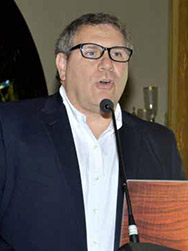
Technology, Israel and India
Rotarians had the pleasure of listening to an entrepreneur, who was born in Israel, brought up in America, and, due to his work, travelled the world. He is none other than Yaacov Ben-Yaacov, the veteran US-Israeli hi-tech entrepreneur. He founded PictureVision, which was the first company to bring the convenience of digital photography to the mass consumer market.
So you might want to read on to get an idea of the kind of clarity he was able to bring to his topic of discussion – Technology, Israel and India.
Earlier this month, Prime Minister Narendra Modi directed our attention to Israel by his recent visit to the “small country.” However, you would be surprised to know that “many of the technologies around the world, were first developed in Israel”, such as gesture recognition technology, pill cameras, and stents for heart surgery, to name a few. Thus, if India were to join hands with Israel, in all likelihood, it would be the beginning of a new chapter in the history of both nations towards “being global leaders…to bring new technology to the world.”
Now you know why Mr. Yaacov, the Founder, CEO, of Catch Media Inc. was one of the many optimistic businessmen who were looking forward to Modi’s Israel visit. But, he was yet to pass his optimism on to us, which he did by pointing out the similarities between the two nations, with regards to innovation; We both have the per capita to have the largest number of startups. Besides, India and Israel are home to R&D centers of some the largest technology companies in the world.
Mr. Yaacov also believes that the British did both the countries a favour “by leaving us in a not so great situation”, since imperialism left us with the ability to envision “how to grow in that situation” – a skill that is enviable in a successful entrepreneur. Why else would venture capitalists begin setting up office in India and Israel?
At one point in history, both countries were considered havens for outsourcing goods, but today, we have the ability to be “a place of innovation.” Taking his own example, to throw light on the possibilities of the two countries working hand in hand, Mr. Yaacov says, “The technology behind Hungama (South Asia’s largest media entertainment company) and Vodafone India has been provided by us.” Which means, his company enables “the Jios (mobile network operators) to keep their consumers,” once his technology enables them to sharpen their B2B analytics.
Mr. Yaacov concludes that it is a misconception that “the secret is in the data”. Instead, it is the metadata – the things that describe what the content is about – is key in order to preserve the consumer. So what his company, Catch Media Inc., does is “collect data, preserve data, and visualise it,” in order to allow companies to target consumers based on their exact requirements. Once again, he shares his optimism by clarifying that there is no other country, except China and India, who are finding ways to provide digital content to both their large populations.
So as Thomas Edison once said, “I know a hundred ways, how not to make a light bulb”; Yaacov Ben-Yaacov, the Edison of metadata analytics believes that there is only one way forward for India and Israel, and that is uniting through technology.
